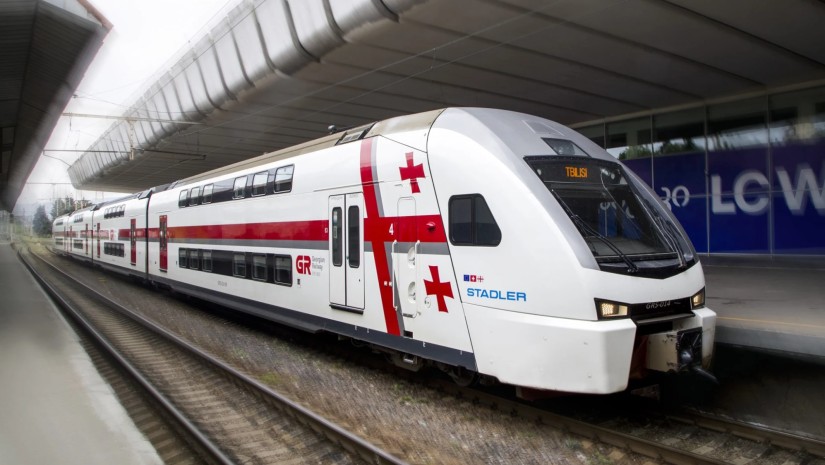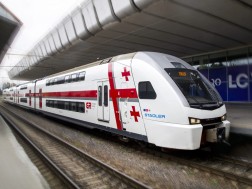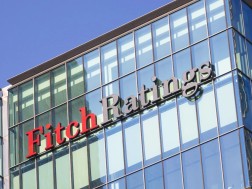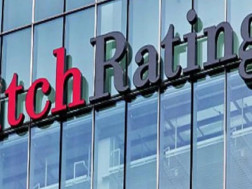Fitch Ratings has revised the Outlook on JSC Georgian Railway's (GR) Long-Term Foreign- and Local-Currency Issuer Default Ratings (IDR) to Stable from Positive and affirmed the IDRs at 'BB-'. A full list of rating actions is below.
The revision of the Outlook reflects Fitch's view that GR will be unable to sustainably improve its financial metrics under the agency's rating case scenario, and that the company's Standalone Credit Profile (SCP) will remain at 'b+'.
The affirmation reflects Fitch's unchanged strong expectation of extraordinary support from Georgia (BB/Negative). Combined with GR's SCP of 'b+', this leads to a single-notch differential between GR's IDRs and Georgia's sovereign IDRs.
KEY RATING DRIVERS
Support Score Assessment 'Strong expectations'
Fitch has 'Strong expectations' that the Georgian government would provide extraordinary support from to GR in case of need, reflecting a support score of 25 (out of a maximum 60) under Fitch's Government-Related Entities (GRE) Criteria. This reflects a combination of responsibility to support and incentive to support factors assessment as below.
Responsibility to Support
Decision Making and Oversight 'Strong'
This assessment is based on GR's status as an integrated railway transportation monopoly with 100% state ownership. It reflects Fitch's view that the state exercises strategic control and oversight over GR's activities. This includes approval of the railway company's budgets and major investments and transactions. GR's supervisory board is nominated and controlled by the government, while goods and services are tendered in accordance with public procurement law. However, despite GR's natural monopoly position, it still has some independence from the state at the operational level, including deregulated tariff setting.
Precedents of Support 'N/A'
Regulatory influence is moderately supportive of GR's financial viability. As the company has received irregular mostly non-cash or indirect state support, Fitch does not factor this into the 'Responsibility to Support' assessment. Historically, GR's long-term development has been supported via state policy incentives and asset allocations. In addition, strategic infrastructure, such as railroads and power transmission lines, is exempt from property tax in Georgia.
Incentives to Support
Preservation of Government Policy Role 'Strong'
As the monopolistic railway operator, GR is a vital economic agent that supports national economic activity via cargo transit. Fitch considers that a default of GR would hamper the company's capital modernisation programme, which would negatively affect Georgia's economic development in the longer term. Although a default may lead to some service disruptions, the company's hard assets would likely remain operational. Consequently, a default would not necessarily lead to significant political and social repercussions for Georgia's government.
Contagion Risk 'Strong'
Fitch considers a potential default of GR on external obligations would be potentially harmful to Georgia, as it could lead to reputational risk for the state. Both GR and the state tap international capital markets for debt funding, as well as loans and financial aid from IFIs to finance reforms and infrastructure modernisation as Georgia's current account is structurally negative.
GR is among the top national corporate issuers in the Eurobond market, so its defaults could significantly impair the borrowing capacity of the government and other GREs due to reliance on external debt, including borrowing from the IMF. This would increase the cost of external funds for future debt financing of other GREs or the state itself.
Standalone Credit Profile
GR's 'b+' SCP reflects the combination of a 'Weaker' risk profile and 'a' financial profile. The SCP assessment also factors in peer comparison, including the company's relatively robust leverage metrics compared with peers.
Risk Profile: 'Weaker'
Fitch assesses GR's risk profile at 'Weaker', reflecting the following combination of assessments:
Revenue Risk: 'Weaker'
This reflects a 'Weaker' assessment of demand characteristics and a 'Midrange' assessment of pricing. The company remains the lead for cargo transit in Georgia, which leads to operating revenue being highly dependent on external economic and political conjuncture. The government has provided GR with exceptional pricing power compared with its international peers. Tariffs in freight and passenger segments are fully deregulated.
Expenditure Risk: 'Midrange'
This assessment reflects GR's fairly well-defined costs with predictable changes. GR's cost structure is stable and is dominated by staff costs, which made up about half of opex in 2023, followed by logistics services (19%) and electricity, fuel and materials (13%). Despite planned downsizing and reductions in headcount, staff costs will remain the largest spending item, accounting for about half of opex over the scenario horizon.
Liabilities and Liquidity Risk: 'Weaker'
GR's debt is all US dollar-denominated and as of end-2023 mostly comprised its USD500 million 4% Eurobonds due in 2028. This expose the company to refinancing and FX risks, although the latter is naturally hedged by GR's revenue structure, more than 90% of which is in US dollars and Swiss francs. Potential liquidity support from the government is limited, since historically GR has received mainly indirect and non-cash support. The company does not have a strong record of tapping local capital market and its ability to raise liquidity from the local banks is limited by the 'BB' counterparty risk.
Financial Profile 'a'
According to the Fitch rating case, the financial metrics suggest GR's financial profile will remain at the upper end of the 'a' category. Preliminary data shows a moderate improvement in GR's EBITDA to about GEL230 million in 2024 from GEL168 million in 2023. This will lead to an improvement in the primary leverage metric (Fitch's net adjusted debt-to-EBITDA) to 5.5x in 2024 from 6.5x in 2023. However, this is a deterioration compared with forecast leverage of 4x in 2024 in our previous base case scenario.
Under the revised rating case scenario, we expect the leverage to average 5x during five-year scenario horizon, despite expecting deleveraging in 2028 when part of the outstanding debt will be repaid. We do not expect sustainable improvement of leverage below 4x, which is a threshold for the potential upward reassessment of the company's financial profile and SCP.
Derivation Summary
GR's financial profile remains commensurate with its SCP of 'b+' under Fitch's Public Policy Revenue-Supported Entities Criteria. The ratings also factor in Fitch's 'Strong expectations' of extraordinary support from the state in case of need as the agency considers GR a GRE linked to the Georgian sovereign under its GRE Rating Criteria. The combination of Fitch's assessment of the probability of extraordinary support from the sovereign to the company and its SCP leads to a one-notch uplift from the company's SCP to the 'BB-' IDR.
Peer railway companies, Kazakhstan Temir Zholy, German Deutsche Bahn AG, and Polish PKP Intercity S.A., are also rated one notch below their respective sovereign ratings. However, based on the support factor assessment, those peers have a stronger assessment of extraordinary support from the respective government, which leads to top down notching expression for their ratings, compared with the bottom up approach applied for the GR.
Short-Term Ratings
GR's short-term rating is 'B', which is the only possible option according to Fitch's short-term rating correspondence table.
Debt Ratings
Senior debt instrument ratings are aligned with GR's Long-Term IDRs.
Issuer Profile
GR is Georgia's 100% state-owned national integrated railway transportation company, with its core business in freight transit operations.
Key Assumptions
Fitch's rating case is a "through-the-cycle" scenario, which incorporates a combination of revenue, cost and financial risk stresses. It is based on 2019-2023 historical figures and 2024-2028 scenario assumptions:
Our key assumptions for the ratings case are:
- Operating revenue growth on average 5.7%, including an 9.4% increase in 2024 compared to five-year historical average of 4.8%
- Opex growth on average 2.6%, including an -0.5% decline in 2024 compared with the five-year historical average of 10.8%
- Net capex on average at GEL151 million for infrastructure maintenance and development of rolling stock
- No equity injections
- Cost of existing debt at 4.0%.
- Rating Sensitivities
Factors that Could, Individually or Collectively, Lead to Negative Rating Action/Downgrade
- Inability to maintain financial performance in line with Fitch's scenario that could justify a downward reassessment of GR's SCP, which could be evidenced by net adjusted debt/EBITDA sustained above 8x according to Fitch's rating case
- A downgrade of Georgia's sovereign ratings by two or more notches or dilution of linkage with the sovereign, resulting in a support score of less than 20 and leading to the ratings being further notched down from the sovereign's IDRs
Factors that Could, Individually or Collectively, Lead to Positive Rating Action/Upgrade
- Improvement of the company's financial profile resulting in a revision of the SCP to the 'bb' category. This may result from net adjusted debt/EBITDA maintaining below 4x on a sustained basis according to Fitch's rating case coupled with robust liquidity metrics
- An upward reassessment of the GRE support score, which may result from stronger regular support from the government, leading to a reassessment of the 'Precedents of Support' risk attribute
















